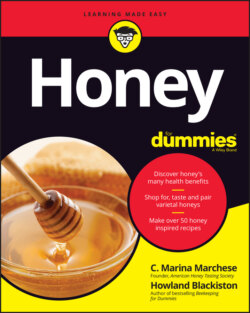Читать книгу Honey For Dummies - Howland Blackiston - Страница 44
Bee Pollen
ОглавлениеMost of us associate pollen with the unwelcome start of allergy season. Pollen is the male sex cells of a flowering plant, which is necessary to fertilize it so it can bear fruit and reproduce. If you are allergic to pollen, you are familiar with the typical symptoms, including headaches, sinus stuffiness, fatigue, and general aches and pains.
Honey bees are hairy creatures that naturally attract pollen while gathering nectar for honey making. They use their feet to comb the tiny pollen granules off their hairy bodies and mix it with nectar and their own enzymes to form it into tiny balls now called bee pollen. Bees will carry the bee pollen balls back to the hive on their hind legs in their pollen baskets. Beekeepers can collect pollen by placing a piece of equipment at the entrance of the hive called a pollen trap. As the bees return back to the hive with pollen in their pollen baskets, they are encouraged to crawl through a narrow hole in the pollen trap, which separates the pollen from their legs. Pollen comes in a rainbow of colors, like honey, depending upon the type of flower it was gathered from. The granules are commonly sold in jars in health-food shops or farmers’ markets.
Bee pollen is said to be nature’s most complete food, containing every nutrient needed to sustain human life. It is a complete source of protein that contains all the basic elements in the human body, including 22 amino acids, 18 vitamins, 25 minerals, 59 trace elements, 11 enzymes or co-enzymes, fatty acids, and carbohydrates. Chock-full of B-complex vitamins and C, D and E, many people consume bee pollen orally for nutrition value similar to a daily vitamin.
Athletes swear that bee pollen increases energy and endurance during competitions. However, the most common reason people consume bee pollen is to build up a natural immunity, especially to seasonal pollen allergies. After all, allergy shots are injections of pollen and other allergens to build your body’s own natural immunity to what you are allergic to, so why not eat your medicine? Sprinkle some bee pollen on salads, or mix it into power smoothies, yogurt, or oatmeal. Since bee pollen is considered a raw superfood, it should be kept refrigerated and consumed within a few months of harvest.
